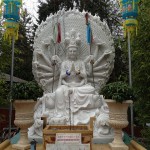This group of slogans is connected with the perfection of patience. This represents our forbearance, our ability to face the difficulties of life without letting them carry us away. The opposite of this is the poison of aversion. This is the capacity to experience difficult with strength and endurance.
This section contains six slogans.
11. Transform All Mishaps Into The Path
Whatever occurs in our lives can be transformed into the path to Enlightenment. Whether we have relationship problems, difficulties with our jobs, health problems…all of these can be just part of the path. Life is full of suffering. We can respond to it with wakefulness instead of despair. It probably sounds like trite self help, but, when people are treating us badly we can use that to help us practice patience. When we experience financial difficulty, we can use that to practice generosity, in the sense of letting go of things.
12. Drive All Blames Into One
Drive all blames into one means that our problems and the complications that are around us aren’t somebody else’s fault, especially in relation to our practice. All the blame can start with us. It’s not necessarily that everything is our own fault in a conventional sense, but we’re driving all blames into one so that we can enter the bodhisattva path. When we drive all blames into one we aren’t laying any of our emotional baggage or blame on anyone else. Because passing blame isn’t helpful. The reason we have to drive all blames into one is because we’ve spent our lives cherishing ourselves and reinforcing our egoic minds. Driving blames into one means we are taking full responsibility for our practice and our lives, regardless of who we could blame for our circumstances.
13. Be Grateful To Everyone
Everything is part of our spiritual journey. Without the world being how it is, there would be no opportunities for us to practice. All of our experiences in life are grounded in our relationships with others. So, the obstacles that others might present to us can be used for our awakening. This slogan follows number 12 for a reason. Once we have taken the responsibility for the circumstances of our lives, it’s easier to be grateful to others. Without others we wouldn’t have the chance to practice compassion or patience. So, everyone around is part of the path. This slogan is about cultivating an understanding that we aren’t separate from other beings. We are all one. So, gratitude is the only response that makes sense. Once we cultivate this kind of open hearted gratitude, we come to dwell in this sense of oneness.
14. See Confusion As Enlightenment And Dwell In Emptiness
In this slogan we are talking about developing a better understanding of the way we perceive things. We don’t see things as they are. We see things as we are. We may not see our minds as Enlightened, but Enlightenment is our true nature and we can engage that. This slogan is founded in using our meditation practices to work with our minds. By practicing diligently we can come to realize that the essence of our being is Emptiness. On the cushion we practice mindfulness and awareness. While we’re practicing confusing thoughts come up and we can come to realize that our thoughts have no real origin, that there is no ‘me’ underneath to cling to. Dwelling in Emptiness is a powerful way to cut through our delusions and emotional baggage. We can perceive our ordinary confusion from a different point of view. We can realize that all of these thoughts and emotions are going to rise and pass away. There’s nothing to hold onto. If we can just pull ourselves away from our baggage and preconceptions for a moment, we can see things as they really are.
15. The Four Practices Are Great Methods
This slogan refers to specific things we can do in our daily life. They are in four categories: doing good, lay down your evil deeds, offering to demons, offering to spirits.
Doing good refers to relating to right action, the cultivation of virtue. When we cultivate virtue we are dwelling in basic goodness, the state of our true nature. We aren’t talking about doing good to receive some kind of reward, but doing good to establish ourselves as virtuous beings on the path.
Laying down our evil deeds starts with looking back at our pasts and seeing how foolish we’ve been. Everyone has a past, a history full of things that they aren’t proud of. The first step is to recognize what your issues are and get tired of them. The second step is to refrain from making the same mistakes in the future that we’ve made in the past. The third step is taking refuge. We are using the dharma to help us transform ourselves into the best versions of ourselves. The fourth step is developing a kind of openness. We don’t hate ourselves for what we’ve done in the past, but we are proud to be able to refrain from the same actions in the future.
Offering to demons is not something I take literally. This is where we appreciate our weaknesses and flaws. We recognize our weaknesses for what they are and acknowledge them as part of our journey, not as reasons to hate ourselves.
Offering to spirits is also not something I take literally. The spirits represent our basic awareness, our ability to be here and now in this moment. We realize our awareness is something we can cultivate and we appreciate that.
16 Whatever You Meet Is The Path
We have the ability to bring the awareness we are cultivating to any situation in life. The concept behind it is that we aren’t going to make enemies out of everything. Whatever comes up isn’t a sudden problem to be overcome or a positive thing to encourage us. Everything just is what it is. Whatever happens, make it part of your spiritual practice.











